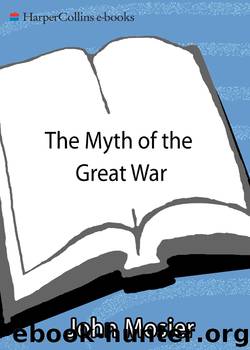The Myth of the Great War by John Mosier

Author:John Mosier [Mosier, John]
Language: eng
Format: epub, mobi
ISBN: 978-0-0620-8411-8
Publisher: HarperCollins
Published: 2001-03-25T16:00:00+00:00
GOALS AND OBJECTIVES
To put it somewhat differently, the Allies were unable to grasp the difference between a goal and an objective. Joffre, for example, had a laudable goal: to run the Germans out of France. And he had a plan: pick a point where the French and British armies butted against one another and attack. What would then happen was fuzzy. The Allied soldiers would break through the German lines, the front would collapse, and the Germans would retreat all the way back to Germany. This breakthrough was simply the idea of the great battle translated into positional warfare. The Germans would either be annihilated or they would be forced to retreat.
The reason the Germans had done this well so far was that they had defined their goal (win the war) by constructing a set of objectives, tangible accomplishments that could be easily measured, and which would move them toward their goal, step by step. The best way to win the war was to beat France on French territory. That meant going through Belgium. In order to move into France through Belgium, the Franco-Belgian fortifications had to be neutralized or destroyed, and quickly enough so that the Allied armies would be caught off-guard and unable to carry the war into Germany.
The Allies had only the general aim of ending the war by beating the Germans somewhere, anywhere, in any way they could. But the German General Staff had concentrated on a series of objectives—concrete and realizable accomplishments that would fit into a plan that would result in their getting to their goal of either winning the war outright, or, at the least, not losing it. The path to both goals, one being the fallback target, was the same.
Germany’s conduct of the war in the first six weeks had been remarkably consistent with the objective of hitting the Allies so hard during that period that they would either lose it outright or only be able to continue the war under the most adverse of circumstances. Prewar, von Moltke had lobbied for ammunition reserves using the argument that it would be a long war, not a short one. The first priority, if either of these goals was to be realized, was the preservation of the German Army in the field. In other words, if the choice was between the probability of fatally weakening the army on the chance of a great victory, or preserving it intact for a long war, the correct decision was preservation. That was why the German General Staff had ordered a withdrawal in September 1914. The decision to withdraw was the concrete and practical execution of an action that would allow Germany to achieve its goals, and without which the goal could not possibly be attained.
A second goal, which arose from the ultimate one—one von Schlieffen had never understood—was to insulate the population from the war, so that Germany would be willing to continue it. War, as von Clausewitz had rather pedantically remarked, is simply an extension of politics by other means.
Download
This site does not store any files on its server. We only index and link to content provided by other sites. Please contact the content providers to delete copyright contents if any and email us, we'll remove relevant links or contents immediately.
The Radium Girls by Kate Moore(10923)
The Templars by Dan Jones(4198)
100 Deadly Skills by Clint Emerson(4091)
Rise and Kill First by Ronen Bergman(4026)
The Doomsday Machine by Daniel Ellsberg(3742)
The Rape of Nanking by Iris Chang(3530)
Killing England by Bill O'Reilly(3466)
Hitler in Los Angeles by Steven J. Ross(3450)
Stalin by Stephen Kotkin(3094)
12 Strong by Doug Stanton(3064)
Hitler's Monsters by Eric Kurlander(2740)
Darkest Hour by Anthony McCarten(2655)
Blood and Sand by Alex Von Tunzelmann(2615)
The Art of War Visualized by Jessica Hagy(2424)
Hitler's Flying Saucers: A Guide to German Flying Discs of the Second World War by Stevens Henry(2305)
The Code Book by Simon Singh(2222)
The Second World Wars by Victor Davis Hanson(2140)
Babylon's Ark by Lawrence Anthony(2077)
Tobruk by Peter Fitzsimons(2068)
